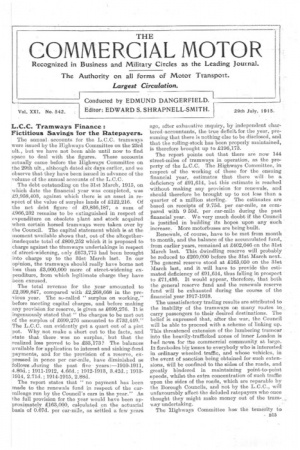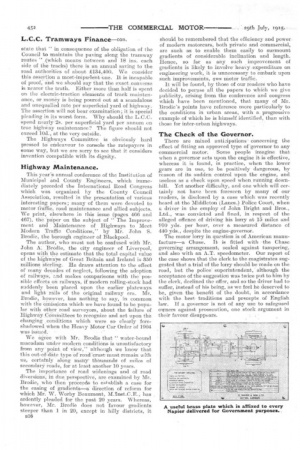L.C.C. Tramways Finance: Fictitious Savings for the Ratepayers.
Page 1

Page 2

If you've noticed an error in this article please click here to report it so we can fix it.
The annual. accounts, for the L.C.. tramways were issued by the Highways Committee on the 23rd ult., but we have not been able until now to find space to deal with the figures. These accounts actually came .before the Highways Committee on the 29th ult., although dated six days earlier, and we observe that they have been issued in advance of the -volume of the annual accounts of the L.C.C.
The debt outstanding on the 31st March, 1915, on which date the financial year was completed, was £9,958,403, against which there is an asset in respect of the value of surplus lands of 1122,216. Of the net debt figure• of £9,836,187; a sum of 4966,232 remains to be extinguished in respect of expenditure on obsolete plant and stock acquired when certain horsed tramways were taken over by the Council. The capital statement which is at the moment available shows that, out of the altogetherinadequate total of £800,252 which it is proposed to charge against tho tramways undertakings in respect of street-widening, only £673,775 had been brought into charge up to the 31st March last. In our opinion, the tramways should really have. borne not loss than £3,000,000 more of street-widening expenditure, from which legitimate charge they have been excused.
The total revenue for the year amounted to £2;399,847, compared with 12,268,668 in the previous year. The so-called " surplus on working," before meeting capital charges, and before making any provision for reserve, is given as £699,276. It is .ingenuously stated that" the charges to be met out of the surplus of £699,276 amounted to £732,449." The L.C.C. can evidently get a quart out of a pint pot. Why not make a short cut to the facts, and state that there. was no surplus, but that the realized loss proved to be £33,173? The balances available for application to interest and sinking-fund .payments, and for the provision of a reserve, expressed in pence per car-Mile, have diminished as • follows .during the past five years:-1910-1911, 4.80d. ; 1911-1912, 4.66c1. ; 1912-1913, 3.42d.; 19181914, 2.71d.; 1914-1916, 2.88d.
The report states that " no payment has been made to the renewals fund in respect of the carmileage run by the Council's cars in the year." As the full provision for the year would have been approximately_ 4163,000, calculated on the actuarial basis of 0.67d. per car-Mile, as settled a few years .ago, after exhaustive inquiry, by independent chartered-accountants, the•true deficit for.the year, presuming that there is nothing else to be disclosed, and that the rolling-stock has been properly maintained, is therefore brought up to £196,173.
The report points out that there are now 144 street-miles of tramways in operatiOn, as the property of the L.C.C. -The Highways Committee, in respect of the working of these for the ensuing financial year, estimates that there will • be a deficiency of £91,614, but this estimate is reached without making any provision for renewals, and should therefore be brought up to not less than a quarter of a .million sterling. The estimates are based on receipts of 9.76d. per car-mile, as compared with 9 ,50d. per car-miLe during the past . financial year. We very much doubt if the Council is justified in building its hopes upon any Such increase. More motorbuses are. being built. Renewals, of course, have to be met from month to month, and the balance of the accumulated fund, from earlier years, remained at 1402,046 on the 31st March last. This dwindling reserve will probably be reduced to £260,000. before the 31st. March next. The general reserve stood at £163,050 on the 31st March last, and it will have to provide the estimated deficiency of £91,614, thus falling in prospect to £71,436. It would appear, 'therefore, that both the general reserve fund and the renewals reserve fund will be exhausted during the course of the financial year 1917-1918.
The unsatisfactory trading results are attributed to the inability of the tramways on many routes carry passengers to their desired destinations. The belief is expressed that, after the war, the Council will be able to proceed with a scheme of linking up. This threatened extension of the lumbering tramcar into the heavily-trafficked zones of inner London is had n.ewe, for the commercial community at large. It forebodes big Losses to everybody who is interested in ordinary wheeled, traffic, and whose vehicles, in the event of sanction being obtained for such extensions, Will be confined to the sides of the roads, and greatly hindered in maintaining point-to-point speeds, whilst the extra concentration of such traffic • upon the sides of the roads, _which are reparable by the Borough Councils, and not by the L.C.C., will unfavourably affect the deluded ratepayers who once thought they might make money out of the tram way undertaking. .
The Highways Committee haw the temerity to
L.C.C. Tramways Finance—corn
state that " in consequence of the obligation of the Council to maintain the paving along the tramway routes " .(which means between and 18 ins, each side of the tracks) there is an annual saving to the road authorities of about £134,400. We consider this assertion a most-inip.udent one. It is incapable of proof, and we should say that the exact converse is nearer the truth. Either more than half is spent Oil the electric-traction elements of track maintenance, or.money is being poured out at a scandalous and unequalled rate per superficial yard of highway. The assertion will not bear examination ; it is special pleading in its worst form. Why should the L.C.C. spend nearly 2s. per superficial yard per annum on true highway maintenance? The figure should not exceed 10d., at the very outside.
The Highways Committee is obviously hard pressed to endeavour to console the ratepayers in some way, but we are sorry to see that it considers invention .compatible with its dignity.
Highway Maintenance.
This year's annual conference of the Institution of Municipal and County Engineers, which imme diately preceded the International Road Congress which was organized by the County Council Association, resulted in the presentation of various interesting papers; many of them were devoted, to motor 6.4Mo, road maintenance and allied subjects. We print, elsewhere in this issue (pages 466 and 467), the "paper on the subject of " The Improvement and : Maintenance of Highways to Meet Modern traffic Conditions," by Mr. John S. Brodie, the borough engineer of Blackpool.
The author, who must not be confused with Mr. John A: -Brodie, the city engineer of Liverpool, opens with the estimate that the total capital value of the highways of Great Britain and Ireland is 350 million sterling. He draws attention to the effect of many decades of neglect, following the adoption of railways, rfnd makes comparisons with the:possible effects on railways, if modern rolling-stock had suddenly been placed upon the earlier plateways and light rails of the original railway era. Mr. Brodie, however, has nothing to say, in common with the. binissions which we have found to be popu lar with other road surveyors, about the iallure of Highway. COMmittees to recognize and act upon the changing , conditions 'which were so clearly foreshadowed *hen the Heavy Motor Car Order of 1004 was issued.
We a. kree with Mr. Brodie that " water-bound macadam under modern conditions is unsatisfactory from any 'point of view," although We know that this out-of=dato type of' road-crust.must remain with us, certainly along many thhuSandg of miles of secondarY roads, for at least another 10 years.
The importance of road wideuings and of road diversions, in due.perspectiVe, are examined by Mr. Brodie:, who then proceeds to establish a case for the easing of gradients—a direction Of reform for which Mr. W. Worby Beaumont, M.Inst.C.E., has ardently pleaded for the past 20 years. Whereas, however, Mr. Brodie does not favour gradients steeper than 1 in 20, except in billy districts, it s16 should he remembered that the efficiency and power of modern motorcars, both private and commercial, are such as to enable them easily to surmount gradients of considerable inclination and length. Hence, so far as any such . improvement of gradients is likely to involveheavy. expenditure on engineering work,. it is unnecessary to .embark upon such improvements, qua motor traffic.
It will be found, by those of our readers who have decided to peruse all the papers to ,whieh we give publicity, arising from the conference and congress which have been Mentioned, that many of Mr. Brodie's points have reference more particularly to the conditions in urban areas, with a. progressive example of which he is himself identified, than with those for inter-urban highways.
The Check of the Governor.
There are mixed anticipationsConcerning the effect of fitting an approved type of 'governor to any .cornmercial motor. Some people iniagine that when a. governor acts upon the engine it is effective, whereas it is found, in practice, when the lower gears are in use, to be positively dangerous, by reason of its sudden control upon. the engine, and useless as a check upon speed when running downhill. Yet another difficulty, and one which will certainly not have been foreseen by many of our readers, is disclosed by a case which. was recently heard at the. Middleton fLancs.) Police Court, when a driver in the employ of John Bright and Bros., Ltd., was convicted and fined, in respect of the alleged offence of driving his lorry at. 15. miles and 910 yds. per hour, over a measured distance of 440 yds., despite the engine-governor.
The motor lorry in question is of American manufacture—a Chase. It is fitted with the Chase governing arrangement-, sealed against tampering,. and also with an A.T. speedometer. Our report of the ease shows that the Clerk to the magistrates suggested that a trial of the lorry should, be-made on the road, but the police' superintendent, although the acceptance of the suggestion Was twice put to him by the clerk, declined the offer, and so the driver had to suffer, iikAead of his being, as 'wefeel he _deserved to he, given the benefit of the doubt, in 'accordance with the besttraditions and precepts . of English law. If a governor is not of any use to safeguard owners against prosecution, one stock argument in their favour disappears. .






















